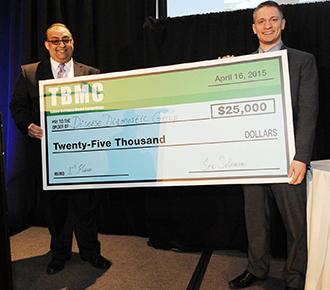Malaria detection device wins Business Model Competition
Disease Diagnostic Group, a startup company with technology to dramatically improve the diagnosis of malaria, won first place and a $25,000 grand prize at the 15th annual Tulane Business Model Competition.

The final round of the competition, an annual presentation of the Levy-Rosenblum Institute for Entrepreneurship, took place at the A. B. Freeman School of Business on Thursday (April 16) with the winners announced later that evening at the Tulane Council of Entrepreneurs Awards Gala at the Audubon Tea Room.
In earning this year’s top prize, Massachusetts Institute of Technology-based DDG edged out runner-up D&P Bioinnovations from Tulane University, which earned the $10,000 second prize, and REEcycle from the University of Houston, which won the third-place prize of $2,500.
DDG’s flagship product is a medical device that uses magnets and lasers to accurately and inexpensively detect the presence of malaria parasites, which produce a magnetic byproduct.
“Current diagnostics are slow, expensive, and require medical expertise and refrigeration,” said DDG co-founder John Lewandowski. “We’ve created a reusable and portable device that leverages those magnetic biomarkers and can be used to diagnose malaria with one drop of blood from a fingertip for one-tenth the cost and 100 times the sensitivity of current techniques.”
Competition judge Srin Vishwanath (PHTM ’97) said he was impressed with both DDG’s technology and business model.
“The three finalists were all very smart and very viable businesses, but Disease Diagnostic Group was furthest ahead in terms of really developing a business model and getting closer to market,” said Vishwanath, CFO of GreenWave Healthcare Technologies. “It was close, but I think all the judges were in agreement that their business plan stood out.”
The 2015 Tulane Business Model Competition drew applications from more than 50 high-potential ventures across the country. Sherif A. Ebrahim, director of entrepreneurship and innovation education at the Freeman School, said this year’s entrants were among the strongest in the competition’s history.
“We received some very well considered business models this year that showed the capacity to pivot based on market feedback, but our three finalists truly represented the best of an impressive group of contenders throughout the competition,” said Ebrahim. “They each applied business model dynamics to create fundable businesses with sustainable value, and all three have the potential to become highly successful companies.”
Interested in advancing your education and/or career? Learn more about Freeman’s wide range of graduate and undergraduate programs. Find the right program for you.
Other Related Articles
- Forbes: 4 Remedies For Reducing Generative AI Mediocrity
- Harvard Business Review: Why AI Boosts Creativity for Some Employees but Not Others
- Forbes: How To Talk Politics With Family Over The Holiday
- AI-powered fund takes top prize in Aaron Selber Jr. Hedge Fund Course
- De Franco appointed Keehn Berry Chair of Banking and Finance
- The Wall Street Journal: For Trump, the Warner Megadeal Talks Are All About CNN
- Research Notes: Matthew Higgins
- NOLA.com: Louisiana venture capital firms, once an afterthought, are big funders of local startups now
